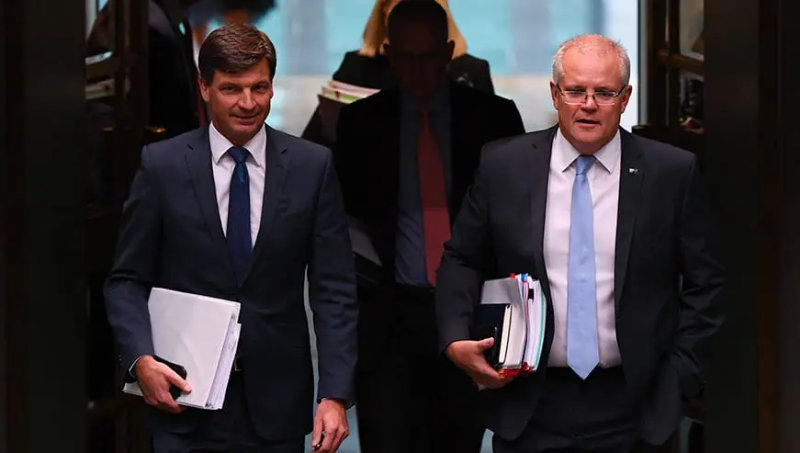By #Mate: Michael West Media.
On its way to electoral oblivion, the Morrison government kept the dollars flowing to select beneficiaries, in defiance of the 70-year-old parliamentary “caretaker” convention, writes #Mate.
On May 16, five days before the election, the then Minister for Industry, Energy and Emissions Reduction, Angus Taylor, announced a $30 million grant to Boral to “explore the feasibility of developing a carbon capture plant in the Southern Highlands.” Given the energy policies of the Labor and the Coalition were very much at odds, this grant appears to have been a breach of the caretaker conventions. (Curiously, Taylor’s facebook video about it has since been deleted, but the announcement features proudly on the Boral website.)
Call them the $600,000 (an hour) men (and women). That’s how much taxpayer money the Morrison government lavished on grants every hour during the six long weeks of the election campaign.
A MWM investigation reveals that during the 2022 election the Morrison government approved hundreds of grants that ‘appear’ to be well outside the boundaries of a governing process that the major parties have observed for over seven decades.
It is called the caretaker conventions and they date back to the days of Robert Menzies, Australia’s longest serving prime minister. The conventions are a feature of Westminster-style democracies. This is why the Liberals’ contempt for the conventions is far more than just another rort or pork.
The caretaker period began at 10:28am on April 11 and ran for 973.5 hours. The value of all grants approved during the caretaker period was $587 million or just over $600,000 per hour.
Contempt for conventions
This analysis views the grants through the lens of the caretaker conventions. During the 40 days of caretaker, over 3000+ grants were approved, to test the compliance with the caretaker conventions, the following questions needs to be asked, was the grant:
- necessary or could they have waited until after the election?
- aligned with or supportive of both parties’ policies?
- binding the incoming government to programs & policies to decisions of the incumbent.
The answers to these questions when asked of both individual, category wide and program-wide grants leave us with the conclusion that the Coalition gave little, if any, concern with compliance to caretaker conventions.
The disregard for democratic convention of the caretaker period may well be the result of the education provided by the PM&C.
Dept of Prime Minister & Cabinet slide pack
The PM&C education pack makes it clear the caretaker convention isn’t law, and adhering to the convention was a matter of personal judgement, common sense, or whether there is some form of precedence.
But it is far more than a convention.
Most Liberals would say Robert Menzies is the greatest conservative prime minister Australia has had. Regardless of affiliation, every politician would recognise the establishment of caretaker conventions as one of his major legacies.
His instruction to his ministers prior to the 1951 election set the precedent for what we now call caretaker conventions. The aim was to level the playing field during election campaigns and to not bind a new government to a previous government’s decisions. Menzies’ precedent-setting letter read:
I should also be glad if you would note that whilst continuing to take whatever action you deem necessary in connection with the ordinary administration of your Department, you should not make decisions on matters of policy or those of a contentious nature without first referring the matter to myself.
The convention brought together the Commonwealth, state and local government politicians. Resolution 32 as it was recorded, provided a definition of the caretaker convention that was agreed by all, it read as follows.
No important new initiative is taken, and no appointment to high office is made, by a government in the period immediately prior to a general election for the House of Representatives unless it can be publicly justified as necessary in the national interest.
Prior to 1987 election the government added greater detail to the caretaker conventions, producing a two page document titled “Handling of Government Business During The Election Period”, having grown to 17 pages.
With regards to grants, it states that during the caretaker period, the business of government continues, and ordinary matters of administration still need to be addressed, [but] the caretaker conventions aim to ensure the incumbent governments actions do not bind an incoming government or limit its freedom of action. Further, that the government [must] avoid making major policy decisions that are likely to commit an incoming government, making significant appointments, and entering major contracts or undertakings.
The 2022 election caretaker – a strange sequence
The approval of grants during the 2022 caretaker period are not only breathtakingly brazen, but give us some insights into the chaos in Coalition. The chaos saw grant announcements being made and promoted in the media before the grant was even approved.
Two large grants in Townsville were approved 16 days into the caretaker period on April 27, however news stories of the grants appeared in the press two weeks earlier. So, what is the order? “Promote then approve” or “approve then promote”.
On average, $600,000 in grants was approved every hour during the caretaker period which began at 10:28am on April 11 and ran for 973.5 hours. The total value of all grants approved during caretaker period was $587 million.
Election 2022 – some choice grants
The sheer number of grants restricts the ability to undertake a deep investigation, but selecting a few categories of grants identifies peculiar patterns.
Family and domestic violence:
- The five-year “Family and Domestic Violence” category saw $12.8m across 11 grants, there are a few peculiarities that invite a deeper look.
- The category appears to be a repeat of the two year 2020-22 program, however there is no program registered and the grants did not have a selection process.
- The eight 2020 recipients averaged $0.65m and were chosen via a “Targeted or Restricted Competitive” process, whereas the eleven 2022 recipients averaged $1.1m with no process.
- The absence of a selection process, grant values exceeding a million dollars and a five-year duration invites the question: how did the minister ensure the $12.8m was an effective or efficient commitment of fundings?
Philanthropy, voluntarism and not-for-profits infrastructure:
- The “Philanthropy, Voluntarism and Not-for-Profits” grant program commenced in May 2021 and with the approval of decisions to be made by December 31, 2021.
- The total value was $955K, which puts it into the miscellaneous category.
- 273 grants were approved for the grants was during caretaker period, averaging $4K each.
- The grants purpose were to allow the “purchase small equipment items to assist volunteers and contribute towards reimbursement of fuel costs, transport costs and background screening checks”.
- Given the end date for spending the grant money was set at the 31st December 2022, it is hard to imagine the urgency that would warrant approval during the caretaker period.
The 2022 election caretaker period – grants by agency
Remembering the caretaker principles include, not “entering major contracts or undertakings” or making decisions resulting in “committing an incoming government”.
Five years and $170m to the Brotherhood of St Laurence – HIPPY:
- The Department of Social Services approved a $170m, five-year grant to the Brotherhood of St Laurence during the caretaker period.
- The grant activity is called “Home Interaction Program for Parents and Youngsters” (HIPPY), successive governments have funded HIPPY.
- HIPPY targets low-income, migrant, culturally diverse and First Nations families, and supports parents to become their child’s first teacher. The initiative helps more than 4000 children in 100 communities every year.
- The substantial infrastructure and proven successes over 15 years makes the decision to continue funding it an easy one.
- The approval was made on May 12, just seven weeks prior to the previous grant period expiring and the next grant commencing.
- The question is why wait until May 12 to approve another five years? Is this a sign of the chaos, dysfunction, and disinterest that had been reported to be common across the Coalition.
Aged care – 38 grants to publicly listed providers:
The aged-care sector has been in decline for years. We’ve had a royal commission, Covid vaccination failures, Covid deaths, staff retention payments, in excess of 140,000 shifts not being filled each week and the hundreds of Defence Force staff now working in aged care.
- Residential aged care has multiple grant programs to provide support to providers, the most substantial is the ‘COVID-19 Aged Care Preparedness’ program.
- Aged-care providers Arcare, Regis and Estia received a total of 38 grants totalling $6.7m during the caretaker period
- In total, $14.9m across 120 ‘Covid-19 Aged Care Preparedness’ grants were approved during the caretaker.
- The significance of the publicly listed providers is they are still paying dividends to shareholders, ironically with franking credits.
Binding an incoming government (3+ years)
Over 600 grants with a duration longer than the next term of government were approved during the caretaker period. The total value of these grants was $261m.
A core principle of the caretaker convention is to not bind an incoming government. These 615 grants lock in grant programs and expenditure the Labor Party would likely have wanted to go on its own programs.

Term of next two governments 6+ years
It is hard to imagine how any grant with a duration of six years would be considered ”administration or business-as-usual” activities of a government. These grants might be assessed as meritorious against the criteria set by the Liberal government, however the policies of the incoming Labor government are substantially different and equally meritorious projects would exist when assessed against the Labor governments criteria.

This analysis assumes all grants have been published. Grants are required to be published within 30 days of approval. The frequency with which the 30-day rule has been breached, is yet another example of the Coalition treating rules as optional.

#Mate is a Twitter identity who tweets on matters of politics, business and hypocrisy. The identity of #Mate is known to Michael West Media but withheld for security reasons.
First published 14 August, 2022.
RELATED STORY:


